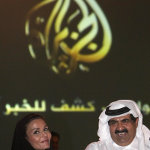Qatar will unveil its first media law in 30 years by the end of 2010. While the release of this much-anticipated law is an important step for Qatar, there already seems to be cause for concern. In an interview with Qatari daily al-Sharq on October 24, Minister for Cabinet Affairs Sheikh Nasser bin Mohammed bin Abdulaziz al-Thani stressed the importance of regulation and the need for more Qataris to work in the media because “any sector that is not supported by native staff can cause misunderstandings.” These statements have left journalists, especially foreign journalists, concerned that the new law might restrict certain types of speech.
When Emir Sheikh Hamad bin Khalifa al-Thani came to power in 1995, he took several steps to enhance Qatar’s image and differentiate it from neighboring Saudi Arabia. As part of this strategy, he declared an end to media censorship, closed the Ministry of Information, and helped personally fund the establishment of al-Jazeera in Doha. Al-Jazeera became increasingly popular as the first Arab satellite news channel to air critical coverage of Arab regimes and cover previously taboo topics. Several Arab regimes temporarily withdrew ambassadors from Qatar or shut down al-Jazeera bureaus. The Emir’s refusal to censor coverage, however, won the praise of international groups such as Reporters without Borders (RWB).
The Qatari regime attempted to build upon this positive attention by opening the Doha Center for Media Freedom, under the patronage of the Emir’s wife Sheikha Mozah, in 2008. The center’s main aim was to promote press freedom around the globe and offer shelter to threatened journalists. Even though al-Jazeera rarely covered Qatari affairs and the U.S. State Department’s Human Rights Report indicated that the Qatari press routinely practiced self-censorship, the Emir’s strategy seemed to be working. Qatar’s place in RWB’s annual press freedom index improved markedly; it moved up from being ranked 115 of 166 countries surveyed in 2003 to 74 of 173 countries surveyed in 2008. UNESCO even chose Qatar as its site for an international conference on International Press Freedom Day in 2009.
Several events in 2009, however, cast doubt on Qatar’s actual commitment to freedom of the press. Robert Ménard, then Director of the Doha Center for Media Freedom, became frustrated when the Qatari government refused to issue visas to threatened journalists, citing diplomatic concerns. He issued a public letter on the center’s website accusing members of the Qatari government of being unsupportive of the center’s mission.
Then in May of 2009, Flemming Rose, the cultural editor who published cartoons depicting the Prophet Muhammad in the Danish press, arrived in Doha as part of the UNESCO-sponsored conference. His attendance sparked outrage among some Qataris, and Ménard received most of the blame. A Doha mosque denounced the media center in Friday prayers. The Qatari daily al-Watan accused Ménard of inviting “Satan” to Doha and insulting all Muslims. In June, a member of Qatar’s Advisory Council (a 35-member legislative body appointed by the Emir) called for Ménard’s dismissal, and Ménard resigned.
Advisory Council Chairman Mohamed bin Mubarak al-Kholaify spurred further debate about the Qatari media by declaring that “hypocrites had entered the field and were trying to spoil the image of the country.” The debate focused on Ménard and his “lack of understanding” of Qatar.
Following this incident, the Advisory Council passed a new media law imposing stiff fines and a one-year jail term for any journalist who slandered the ruler or threatened national security, religion, or the Qatari Constitution. Editor-in-Chief Khalid al-Sayed of the Qatari daily The Peninsula issued a front page criticism in June 2009, writing “We find it strange that the Advisory Council, made up of Qatari nationals, has this kind of opinion when His Highness the Emir has given us the freedom to voice our opinion on issues freely and in a fair manner.” The law was left unsigned by the Emir, and to date, the only official media law in the country is still the 1979 Press and Publications Law.
By the summer of 2009, journalists were asking that a new media law be drafted with their input. The government announced in October 2010 that a new media law would be ready by the end of this year, but it is still unclear whether the media will be consulted. As Khalid al-Sayed explained in a recent conversation, “We hope that the new law will also be reviewed by the media…after all, this law concerns the media so it is only right that the media should know and be aware about it.” Journalists are concerned that the law might prohibit criticism of the Qatari state, the Emir, or Islam—such provisions are extremely common in the media laws of Arab countries—which al-Sayed argues is unnecessary. He noted in a May 2010 editorial that no article in the Qatari press has ever caused the state, the Emir, or Islam any harm.
Even before the law comes out, Qatar’s most recent rankings in the RWB press freedom index reflect concern about press freedom in the country. Qatar’s rankings fell in both 2009 and 2010; it is now ranked 121 out of the 178 countries surveyed. If the new media law imposes fines or imprisonment for certain types of speech, journalists will surely protest and efforts to differentiate Qatar from its neighbors will suffer a serious setback.
Jennifer Lambert recently completed her PhD dissertation on domestic reform and external legitimacy in Qatar. She currently teaches at the George Washington University and works as an Arab Media Analyst at Strategic Social.






